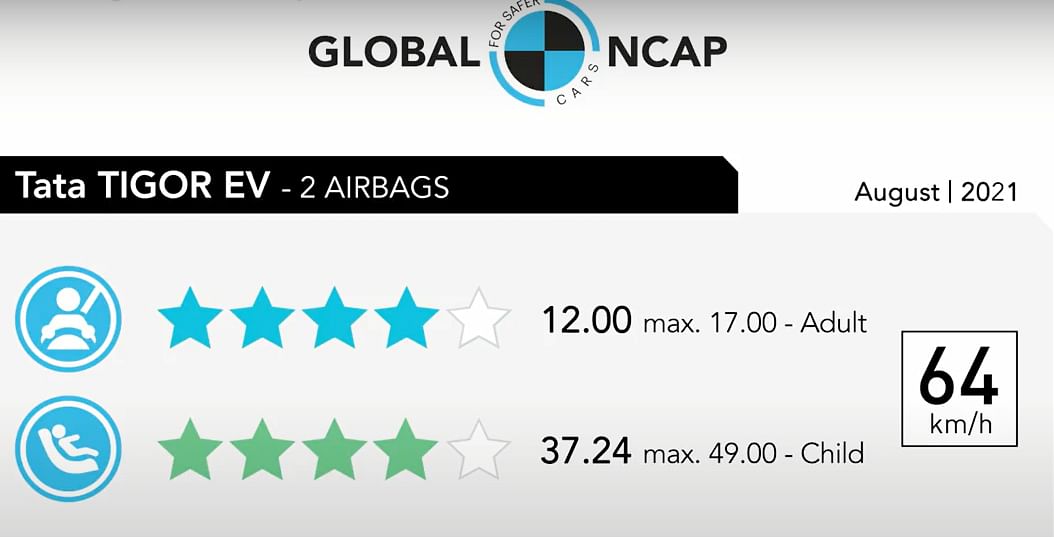Tata Tigor EV shines with 4-star rating in Global NCAP’s first EV crash test
Tigor EV is the eighth Tata car, and the 44th overall tested under the ‘Safer Cars for India’ programme that began in 2014.
Tata Motors has received yet another strong safety rating for its passenger vehicles. The Tata Tigor EV, the first Electric Vehicle (EV) ever tested by Global NCAP, has received a strong four-star rating for both adult and child occupants, in the latest crash test under the safety watchdog’s ‘Safer Cars For India’ programme.
According to Global NCAP, the recently unveiled Tata Tigor EV was assessed in its most basic safety specification, fitted with two airbags as standard. The EV’s test score of 12 out of a maximum 17 for adult occupation, and 37.24 out of 49 for child occupation, helped it earn the 4-star rating. Global NCAP says it found the head and chest protection for the adult and child passengers to be “good”, and “adequate” for the driver. However, the bodyshell and footwell area of the Tigor EV were rated as “unstable”.
The Tigor EV is the eighth Tata car, and the 44th overall tested under the ‘Safer Cars for India’ programme that was started in 2014.

In a statement on the latest test, Global NCAP said that further improvement could be made to the Tigor by equipping the model with standard fitment of Electronic Stability Control (ESC), side impact protection, three-point belts in all seating positions and ISOFIX connectors. Alejandro Furas, Secretary General of Global NCAP said, “Tata has shown consistent safety improvements throughout its fleet range. The Tigor demonstrates that improvements are also possible with EV models, which can pose a technical challenge because of the electric powertrain system.”
Commending Tata Motors for a “continuing commitment to safety” with new powertrain technologies in order to achieve wider environmental and sustainability goals, David Ward, President of the Towards Zero Foundation said, “Safety and sustainability improvements are possible for all manufacturers operating in the Indian market,” and adds that “Global NCAP would encourage them to follow Tata’s lead.”
How the Tigor EV fared
Adult occupant protection: The protection offered to the driver head was good and passenger’s head was adequate. Both front passengers’ neck showed good protection. Driver chest showed adequate protection and passenger chest showed good protection. Driver and passenger knees showed marginal protection as they could impact with dangerous structures behind the dashboard supported by the tranfascia tube. Driver and passenger bias showed adequate and good protection. The bodyshell was rated as unstable and it was not capable of withstanding further loadings. Footwell area was rated as unstable. The car offers standard Seat Belt Reminder (SBR) for driver and passenger.
Child occupant protection: The child seat for the 3 year old and 1.5 years old were installed rearwards facing with the adult seatbelt and were able to prevent excessive forward movement during the impact. Chest and head protection was good. Child Restraint Systems (CRS) marking was permanent. The recommended CRS did not show incompatibility. The vehicle offered a lap belt in the rear centre position. The car does not offer ISOFIX anchorages. All of the above explained the four star for child occupant protection.
The Tigor EV is Tata Motors’ second electric vehicle for the personal segment. Powered by the OEM’s ‘Ziptron’ technology, the compact sedan offers 55 kW of peak power and 170 Nm of torque. The Tigor EV is the reborn, premium avatar of the Tigor EV which was Tata Motors’ entry vehicle into the EV market in December 2017. In July 2021, the company introduced a new version with different specifications, called the Xpres-T, under the new ‘Xpres’ business vertical for the fleet segment.
Tata cars ride the safety curve
Tata Motors is one automaker that has been focusing high on improving vehicle safety over the last few years with its new platforms – ALFA (Agile, Light, Flexible, Advanced) and Omega-ARC – spawning its latest range of cars and SUVs.
In December 2018, the Nexon crossover became India’s first five-star-rated car by Global NCAP. It was soon followed by the Tiago hatchback and Tigor sedan duo that scored a respectable four stars for their price-conscious segment.
Tata’s premium hatchback Altroz too aced the crash tests with a five-star rating in January 2020, and now the Tigor EV takes the carmaker's game forward in the electric vehicle space as well.
Deployment of advanced digital simulation techniques and giving importance to minutest details in the form of joineries, profiles and materials during vehicle development have been the key driving factors for the company's robust performance in the vehicle safety domain.
RELATED ARTICLES
Cosmo First diversifies into paint protection film and ceramic coatings
The Aurangabad, Maharashtra-based packaging materials supplier is leveraging its competencies in plastic films and speci...
JSW MG Motor India confident of selling 1,000 M9 electric MPVs in first year
The 5.2-metre-long, seven-seater luxury electric MPV, which will be locally assembled at the Halol plant in Gujarat, wil...
Modern Automotives targets 25% CAGR in forged components by FY2031, diversifies into e-3Ws
The Tier-1 component supplier of forged components such as connecting rods, crankshafts, tie-rods, and fork bridges to l...






 By Autocar Professional Bureau
By Autocar Professional Bureau
 31 Aug 2021
31 Aug 2021
 14722 Views
14722 Views














